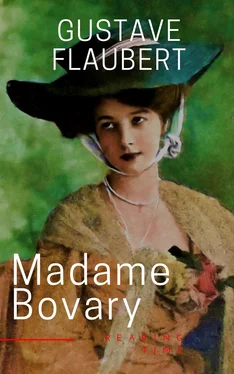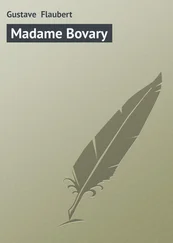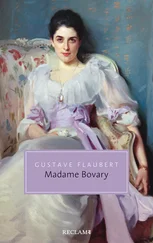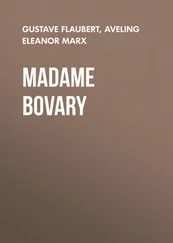1 ...8 9 10 12 13 14 ...19 She began by looking round her to see if nothing had changed since last she had been there. She found again in the same places the foxgloves and wallflowers, the beds of nettles growing round the big stones, and the patches of lichen along the three windows, whose shutters, always closed, were rotting away on their rusty iron bars. Her thoughts, aimless at first, wandered at random, like her greyhound, who ran round and round in the fields, yelping after the yellow butterflies, chasing the shrew-mice, or nibbling the poppies on the edge of a cornfield.
Then gradually her ideas took definite shape, and, sitting on the grass that she dug up with little prods of her sunshade, Emma repeated to herself, "Good heavens! Why did I marry?"
She asked herself if by some other chance combination it would have not been possible to meet another man; and she tried to imagine what would have been these unrealised events, this different life, this unknown husband. All, surely, could not be like this one. He might have been handsome, witty, distinguished, attractive, such as, no doubt, her old companions of the convent had married. What were they doing now? In town, with the noise of the streets, the buzz of the theatres and the lights of the ballroom, they were living lives where the heart expands, the senses bourgeon out. But she—her life was cold as a garret whose dormer window looks on the north, and ennui, the silent spider, was weaving its web in the darkness in every corner of her heart.
She recalled the prize days, when she mounted the platform to receive her little crowns, with her hair in long plaits. In her white frock and open prunella shoes she had a pretty way, and when she went back to her seat, the gentlemen bent over her to congratulate her; the courtyard was full of carriages; farewells were called to her through their windows; the music master with his violin case bowed in passing by. How far all of this! How far away! She called Djali, took her between her knees, and smoothed the long delicate head, saying, "Come, kiss mistress; you have no troubles."
Then noting the melancholy face of the graceful animal, who yawned slowly, she softened, and comparing her to herself, spoke to her aloud as to somebody in trouble whom one is consoling.
Occasionally there came gusts of winds, breezes from the sea rolling in one sweep over the whole plateau of the Caux country, which brought even to these fields a salt freshness. The rushes, close to the ground, whistled; the branches trembled in a swift rustling, while their summits, ceaselessly swaying, kept up a deep murmur. Emma drew her shawl round her shoulders and rose.
In the avenue a green light dimmed by the leaves lit up the short moss that crackled softly beneath her feet. The sun was setting; the sky showed red between the branches, and the trunks of the trees, uniform, and planted in a straight line, seemed a brown colonnade standing out against a background of gold. A fear took hold of her; she called Djali, and hurriedly returned to Tostes by the high road, threw herself into an armchair, and for the rest of the evening did not speak.
But towards the end of September something extraordinary fell upon her life; she was invited by the Marquis d'Andervilliers to Vaubyessard.
Secretary of State under the Restoration, the Marquis, anxious to re-enter political life, set about preparing for his candidature to the Chamber of Deputies long beforehand. In the winter he distributed a great deal of wood, and in the Conseil General always enthusiastically demanded new roads for his arrondissement. During the dog-days he had suffered from an abscess, which Charles had cured as if by miracle by giving a timely little touch with the lancet. The steward sent to Tostes to pay for the operation reported in the evening that he had seen some superb cherries in the doctor's little garden. Now cherry trees did not thrive at Vaubyessard; the Marquis asked Bovary for some slips; made it his business to thank his personally; saw Emma; thought she had a pretty figure, and that she did not bow like a peasant; so that he did not think he was going beyond the bounds of condescension, nor, on the other hand, making a mistake, in inviting the young couple.
On Wednesday at three o'clock, Monsieur and Madame Bovary, seated in their dog-cart, set out for Vaubyessard, with a great trunk strapped on behind and a bonnet-box in front of the apron. Besides these Charles held a bandbox between his knees.
They arrived at nightfall, just as the lamps in the park were being lit to show the way for the carriages.
The chateau, a modern building in Italian style, with two projecting wings and three flights of steps, lay at the foot of an immense green-sward, on which some cows were grazing among groups of large trees set out at regular intervals, while large beds of arbutus, rhododendron, syringas, and guelder roses bulged out their irregular clusters of green along the curve of the gravel path. A river flowed under a bridge; through the mist one could distinguish buildings with thatched roofs scattered over the field bordered by two gently sloping, well timbered hillocks, and in the background amid the trees rose in two parallel lines the coach houses and stables, all that was left of the ruined old chateau.
Charles's dog-cart pulled up before the middle flight of steps; servants appeared; the Marquis came forward, and, offering his arm to the doctor's wife, conducted her to the vestibule.
It was paved with marble slabs, was very lofty, and the sound of footsteps and that of voices re-echoed through it as in a church.
Opposite rose a straight staircase, and on the left a gallery overlooking the garden led to the billiard room, through whose door one could hear the click of the ivory balls. As she crossed it to go to the drawing room, Emma saw standing round the table men with grave faces, their chins resting on high cravats. They all wore orders, and smiled silently as they made their strokes.
On the dark wainscoting of the walls large gold frames bore at the bottom names written in black letters. She read: "Jean-Antoine d'Andervilliers d'Yvervonbille, Count de la Vaubyessard and Baron de la Fresnay, killed at the battle of Coutras on the 20th of October, 1857." And on another: "Jean-Antoine-Henry-Guy d'Andervilliers de la Vaubyessard, Admiral of France and Chevalier of the Order of St. Michael, wounded at the battle of the Hougue-Saint-Vaast on the 29th of May, 1692; died at Vaubyessard on the 23rd of January 1693." One could hardly make out those that followed, for the light of the lamps lowered over the green cloth threw a dim shadow round the room. Burnishing the horizontal pictures, it broke up against these in delicate lines where there were cracks in the varnish, and from all these great black squares framed in with gold stood out here and there some lighter portion of the painting—a pale brow, two eyes that looked at you, perukes flowing over and powdering red-coated shoulders, or the buckle of a garter above a well-rounded calf.
The Marquis opened the drawing room door; one of the ladies (the Marchioness herself) came to meet Emma. She made her sit down by her on an ottoman, and began talking to her as amicably as if she had known her a long time. She was a woman of about forty, with fine shoulders, a hook nose, a drawling voice, and on this evening she wore over her brown hair a simple guipure fichu that fell in a point at the back. A fair young woman sat in a high-backed chair in a corner; and gentlemen with flowers in their buttonholes were talking to ladies round the fire.
At seven dinner was served. The men, who were in the majority, sat down at the first table in the vestibule; the ladies at the second in the dining room with the Marquis and Marchioness.
Emma, on entering, felt herself wrapped round by the warm air, a blending of the perfume of flowers and of the fine linen, of the fumes of the viands, and the odour of the truffles. The silver dish covers reflected the lighted wax candles in the candelabra, the cut crystal covered with light steam reflected from one to the other pale rays; bouquets were placed in a row the whole length of the table; and in the large-bordered plates each napkin, arranged after the fashion of a bishop's mitre, held between its two gaping folds a small oval shaped roll. The red claws of lobsters hung over the dishes; rich fruit in open baskets was piled up on moss; there were quails in their plumage; smoke was rising; and in silk stockings, knee-breeches, white cravat, and frilled shirt, the steward, grave as a judge, offering ready carved dishes between the shoulders of the guests, with a touch of the spoon gave you the piece chosen. On the large stove of porcelain inlaid with copper baguettes the statue of a woman, draped to the chin, gazed motionless on the room full of life.
Читать дальше











